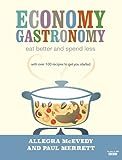
Slow cooking is the best way to eat off the grid. Here is the philosophy for successful slow stews.
It’s an icy winter’s day in west London and Allegra McEvedy’s kitchen is filled with spice-fragrant steam. As she stirs a huge pan of gumbo, a richly flavoured sausage and prawn casserole, McEvedy, who recently starred in the BBC TV series Economy Gastronomy (buy the book in the US) , becomes increasingly evangelical. “The recession was the kick up the backside that people needed to eat better and waste less,” she says.
At this time of year, braises and stews with lots of vegetables and cheaper cuts of meat are the answer. The joy of slow cooking is that it is low stress, she explains. “It doesn’t matter if you add two tablespoons of vinegar or eight. The great thing is to get it cooking. You can adjust the flavours along the way.”
Balance is the secret. “Aim for a subtle sweet and sour flavour, adding a spoonful of honey as well as vinegar. You won’t notice them in the finished dish, but they add an imperceptible new layer and the joy of slow cooking is the layers of flavour.”
Vinegar will also mellow a casserole with too much chilli, and a squeeze of lemon juice will go some way to rebalancing the flavours if it’s over-salted. If it is really salty, there is nothing for it but to make a second, unsalted batch and mix the two. Happily, most slow cooks freeze well, so what doesn’t get eaten can be stashed away.
The gumbo is bathed in a thick, rich sauce. “Incredibly tasty and comforting. It’s nuts to eat any other way.”
Economy Gastronomy by Allegra McEvedy and Paul Merrett is available from Amazon US or Amazon UK